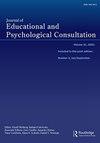Effects of a Problem-Solving Team Consultation on the Problem-Solving Process: An Evaluation of Concept Knowledge, Implementation Integrity, and Student Outcomes
IF 1.1
4区 心理学
Q4 PSYCHOLOGY, EDUCATIONAL
Journal of Educational and Psychological Consultation
Pub Date : 2022-04-29
DOI:10.1080/10474412.2022.2068020
引用次数: 1
Abstract
ABSTRACT We examined the outcomes of elementary school-based problem-solving teams (PSTs) who participated in a multi-component consultation focused on enhancing systematic problem solving. Consultation provided to each PST included training in the use of a problem-solving protocol (i.e., Outcomes: Planning Monitoring, and Evaluating [Outcomes: PME]) and subsequent performance feedback and training regarding team use of the protocol. A train-the-trainer model was used whereby researchers trained school psychologists to deliver the intervention and serve as coaches on the PSTs. At baseline, all three PSTs demonstrated low (i.e., <50%) problem-solving procedural integrity (i.e., the degree to which critical components of the problem-solving process were implemented), often scoring lowest for problem-solving components related to data collection and analysis (e.g., treatment integrity, progress monitoring, and pre-post intervention data). Each PST demonstrated increased problem-solving integrity following implementation of the first intervention component, problem-solving information and Outcomes: PME training. Procedural integrity also increased for the two PSTs that received the second intervention component, performance feedback. An increase in procedural integrity was not found for one PST that received the third intervention component, targeted consulting; however, data collection was incomplete. Results are discussed in terms of future research priorities to examine consultation that promotes the use of quality team problem-solving components.问题解决团队咨询对问题解决过程的影响:对概念知识、实施完整性和学生成果的评估
摘要:我们研究了小学校本问题解决小组(PSTs)的结果,他们参与了一项多成分咨询,重点是加强系统的问题解决。向每位PST提供的咨询包括使用解决问题方案的培训(即成果:规划、监测和评估[成果:PME]),以及随后的绩效反馈和团队使用方案的培训。研究人员使用了培训师模式,培训学校心理学家进行干预并担任心理战的教练。在基线时,所有三项PST都表现出较低(即<50%)的解决问题程序完整性(即解决问题过程的关键组成部分得到实施的程度),与数据收集和分析相关的解决问题组成部分(如治疗完整性、进展监测和干预前后数据)得分通常最低。在实施第一个干预组成部分、解决问题信息和结果:PME培训后,每个PST都表现出了解决问题的完整性增强。接受第二个干预成分——绩效反馈的两个PST的程序完整性也有所提高。接受第三个干预部分,即有针对性的咨询的一名PST没有发现程序完整性的增加;然而,数据收集不完整。根据未来的研究重点讨论结果,以检查促进使用高质量团队解决问题组件的咨询。
本文章由计算机程序翻译,如有差异,请以英文原文为准。
求助全文
约1分钟内获得全文
求助全文
来源期刊

Journal of Educational and Psychological Consultation
PSYCHOLOGY, EDUCATIONAL-
CiteScore
3.40
自引率
23.50%
发文量
20
期刊介绍:
The Journal of Educational & Psychological Consultation (JEPC) provides a forum for improving the scientific understanding of consultation and for describing practical strategies to increase the effectiveness and efficiency of consultation services. Consultation is broadly defined as a process that facilitates problem solving for individuals, groups, and organizations. JEPC publishes articles and special thematic issues that describe formal research, evaluate practice, examine the program implementation process, review relevant literature, investigate systems change, discuss salient issues, and carefully document the translation of theory into practice.
 求助内容:
求助内容: 应助结果提醒方式:
应助结果提醒方式:


